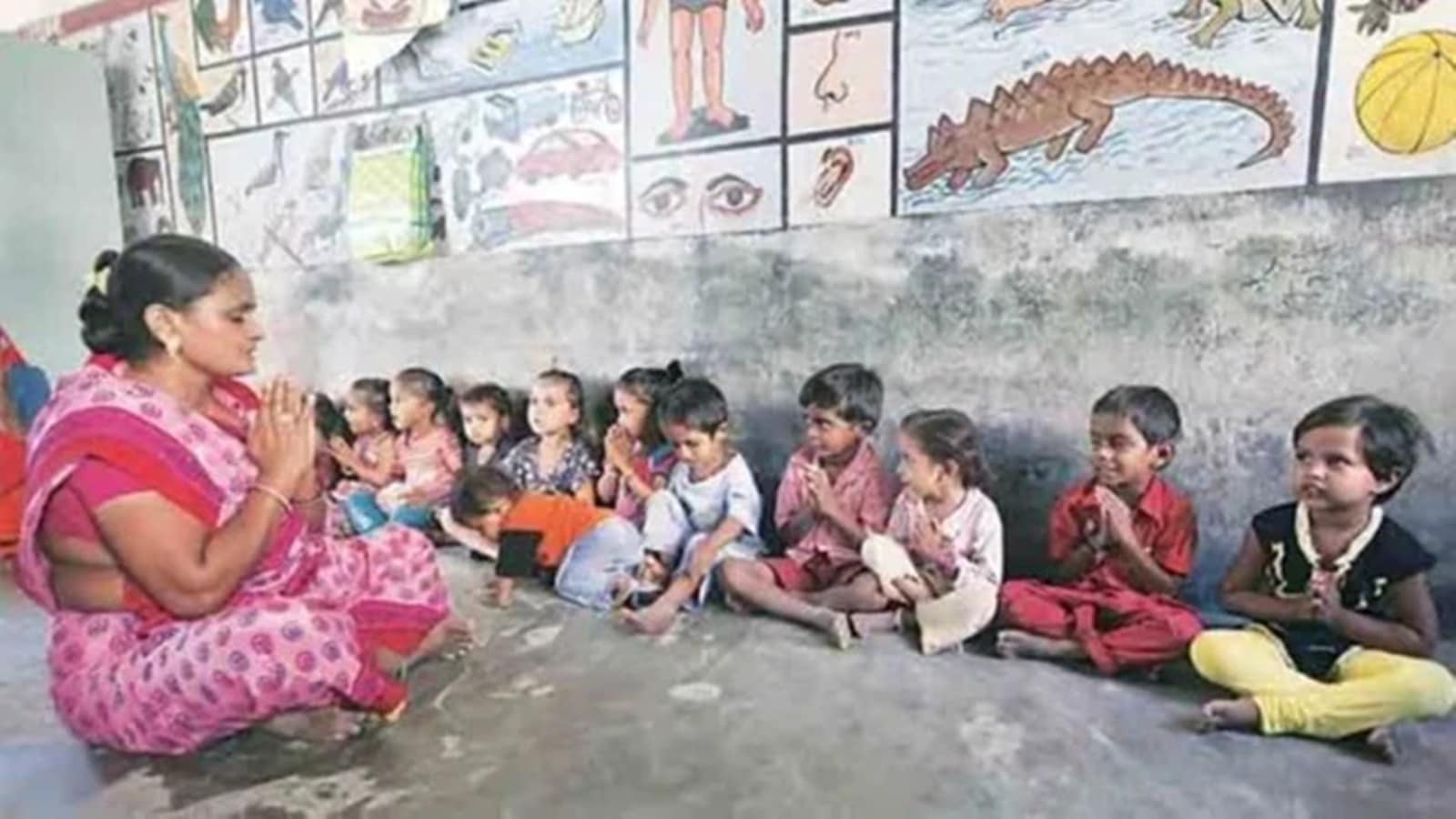Inadequate infrastructure and insufficient manpower at Anganwadis, unmet targets of Supplementary Nutrition Programme, Early Childhood Care and Education as well as nutrition programmes for ante-natal and post-natal care, and unspent funds found in ‘personal ledger accounts’ of development officers, found during the audit of the implementation of Integrated Child Development Services (ICDS) Scheme by the Women and Child Development (WCD) Department, has prompted the Comptroller Auditor General (CAG) to recommend “corrective actions”.
The performance audit of ‘Implementation of Integrated Child Development Services Scheme’ for the period from 2015-16 to 2022-23 covered eight out of 33 districts, involving interactions with 10 District Programme Officers (DPOs), 22 Child Development Project Officers (CDPOs) from specific blocks and inspection of 99 Anganwadi Centres (AWCs) from 22 blocks at the grassroots level.

The audit identified a shortage of 16,045 AWCs in Gujarat and pointed out that 40.34 lakh children (up to the age of 6) were enrolled from 2015-16 to 2022-23 as against 77.77 lakh children as per the census in 2011. The report, which also assessed the “adequacy of infrastructure facilies” of Anganwadis, highlighted “significant challenges”, which “have implications for the overall quality of services delivered under the ICDS Scheme”.
The report states, “Among the total 53,029 AWCs in the State, 3,381 were operating from temporary structures and 30 were located in open spaces. Additionally, 8,452 AWCs had dilapidated buildings indicating that the WCD Department is yet to ensure safe and secure pukka AWC buildings for service delivery under the Scheme. None of the AWCs, including those built between 2015 and 2023, met the specified requirement of a covered area of 600 square feet per 30 children, leading to overcrowding…”
The report states that 1,299 AWCs (2.45 per cent) had no toilets, and 1,032 AWCs (1.95 per cent) lacked drinking water facilities. Additionally, in 2019-20, the WCD Department released grants of Rs 200.13 lakh to 11 districts for the construction of ramps with railings for easy accessibility for children with disabilities at 807 AWCs — of which only 220 AWCs (27.26 per cent) had constructed those until September 2024.
Observing contamination of the take-home ration (THR) by rodents, the report states, “During visits to 99 selected AWCs, it was observed that cooking and serving utensils, storage facilities for THR packets, growth measurement devices and medicine kits were lacking. Furthermore, 6,709 water purifiers costing Rs 382.29 lakh were unused due to inadequate infrastructure for water and electricity connections… Inadequate storage facilities in several AWCs resulted in contamination of Take-Home Ration packets by rodents in 11 AWCs. Inefficient pest control measures compounded this issue….”
The report also points out that grants remained unspent and held in “personal ledger accounts” of DDOs and TDOs. “In seven of eight selected Districts and 12 out of 22 selected Blocks, a substantial amount of ₹242.39 crore remained unspent as of March 2023. These funds were held in the Personal Ledger Accounts of District Development Officers and Taluka Development Officers. These unutilised funds were not factored into the budget preparation by the WCD Department. The WCD Department submitted inaccurate Utilisation Certificates (UCs) to the GoI. Over the period of 2015-19, grants worth ₹69.73 crore were parked but shown as spent in the UCs provided to the GoI. As of March 2023, unspent grants of ₹5.05 crore remained parked with the Department,” it states.
Story continues below this ad
The report also states that 56.70 per cent of posts of CDPOs and 14.35 per cent posts of women supervisors were vacant in the blocks and that the department had not implemented the switch over to new insurance schemes with enhanced benefits for staff under the Pradhan Mantri Jeevan Jyoti Bima Yojana (PMJJBY) and Pradhan Mantri Suraksha Bima Yojana (PMSBY) despite a July 2018 notification from the government of India.
While it appreciated the January 2020 implementation of online system to monitor the supply of THR from Gujarat Cooperative Milk Marketing Federation Limited to prevent “timely delivery and prevent misuse”, the audit report also stated that out of the 4.63 crore beneficiaries enrolled under the Supplementary Nutrition Programme (SNP), 3.99 crore (86 per cent) received the benefits.
The audit report states that the state government’s Early Childhood Care and Education (ECCE) fell short in providing preschool education (PSE) with only 18.79 per cent children aged 3 to 6 having enrolled in Anganwadis during 2015-2023. However, 94 per cent children aged up to one year was covered under the Universal Immunisation Programme, it added.
The audit report also stated that under the Nutrition and Health Education (NHE), the shortfall in household visits by Anganwadi workers “increased by 16 per cent (32.93 to 48.76) during the period from 2015-16 to 2020-21. However, the department picked it up well and showed significant improvement in reducing the shortfall to 14.76 per cent in 2021-22 and further to 5.38 per cent in 2022-23”.
Story continues below this ad
The report also states that the percentage of low-birth-weight infants decreased from 12.33 per cent in 2017-18 to 11.63 per cent in 2022-23. “However, the department is yet to achieve the target of reducing the proportion of low birth-weight newborns by two per cent per annum as per the National Nutrition Mission (NNM) guidelines, 2017,” it states. The report pointed out that Gujart had faced “under-registration of Pregnant Women (PW) and inadequate antenatal and postnatal services”, stating that the coverage of ante-natal and post-natal care, immunisation, and administration of IFA tablets for pregnant and lactating mothers was “notably insufficient from 2015 to 2023” when compared to the “total pregnant and lactating mothers registered with the Health Department”.
The CAG report states that the Performance Audit involved a thorough review of documents within the WCD Department, Health and Family Welfare Department and the Commissionerate of the WCD Department. It also said that at various points, while responding to auditors at the time of CAG inspections, the government “acknowledged and assured” to take corrective steps.
When contacted, a senior official of the state government’s ICDS programme refused to comment on the CAG findings and said, “We have not yet gone through the report tabled in the Assembly… We cannot comment on the findings at this point.”









